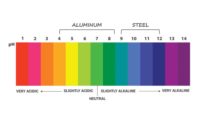by Randy Rawson, ABMA
Based on a presentation to a group of stakeholders in mid-February, the U. S. Department of Energy’s Industrial Technologies Program, within its Energy Efficiency and Renewable Energy division, has contracted with an outside, private consultant to devise a way of collecting information on effective industrial efficiency technologies and companies that sell those technologies.
Alternately dubbed an efficiency technology “buyers guide” or an efficiency blog by some in the Department, I question just how appropriate such a government-sponsored and endorsed resource would be.
According to the presentation by USDOE’s consultancy contractor, an ill-defined group of individuals would be given the power to decide what companies and which of their technologies would be listed in this buyers guide. My question to USDOE was then and still is: what are the parameters within which these decisions are going to be made, who sets those parameters, and does being listed in this buyers guide infer endorsement by USDOE of commercial businesses and/or the technologies listed? More importantly, does not being included mean you or your technology is not "worthy" in the eyes of the US government?
When asked why this federally supported buyers' guide was necessary at all, I was told that it is in response to questions from end-users on how to find efficiency technology purveyors and how to know whether the technologies they offer are as effective as advertised.
There are myriad resources available to end-users to answer these types of questions without the federal government getting involved in choosing one company over others or one technology over others -- not the least of which is the Internet, national trade and professional associations, design and consultingengineers, local rep companies, and, yes, even the manufacturers themselves.
I was also told recently that the buyers guide focus of the USDOE consultants has been modified to become a blog rather than a buyers guide, apparently in response to my concerns about government endorsement of some technologies over others. The Department is now looking at the creation of a blog on which end-users, manufacturers, and others can proclaim the veracity and efficacy of their products, as well as to register complaints about companies and their technologies not meeting their advertised merits. Come one, come all. Come on, now.
I understand that we all should be adapting to the use of such new services as blogs, social networking sites, and the like, but I question their utility as vehicles for commercial endorsements and critiques. It sounds like we are going from a list of players chosen by dubious processes and, perhaps, even favoritism, to an even more confusing - for the end-user - set of unregulated postings of unvetted expressions of opinion, all under the aegis of the United States Department of Energy.
The DOE should not be engaged in any activity, using their resources or cyberspace, that endorses any commercial activity or technology over others. The free market doesn’t need that kind of governmentinterference; our existing free market already provides for more than adequate give and take between suppliers and their customers.
If the DOE intends to follow through with ideas like these without providing for balanced, publicly crafted standards by which they decide about what companies and technologies to endorse, then the Department should be fully and legally prepared to document their endorsements so that those who rely on them are not even inadvertently flimflammed by their own government. This is just another example of a federal misuse of funds, in a time of already high budget deficits and serious needs elsewhere in the energy sector, to pay for consultants to come up with pipe dreams based on flimsy needs.
The boiler industry is ready and willing to provide reliable guidance as to state-of-the-art, fuel-flexible technologies to meet customer needs for efficiency, emissions-control, reliability, appropriate payback,and safety - in sectors ranging from the commercial/institutional to the industrial and the utility. And we are armed with the case studies to prove the validity of various applications of those technologies. Every application is different and has differing exigencies, and there is no better resource than the manufacturer to answer all customer questions.
All an end-user has to do is go to http://www.abma.com/BuyersGuide.pdf , and they are linked up with resources of expertise found no where else. The last thing we need now is another ham-handed federal agency and their outside consultants deciding - with no preset qualifications - with whom end-users should or should not do business.
Rawson is the president/CEO of the American Boiler Manufacturers Association (ABMA). Reach him at randy@abma.com.



